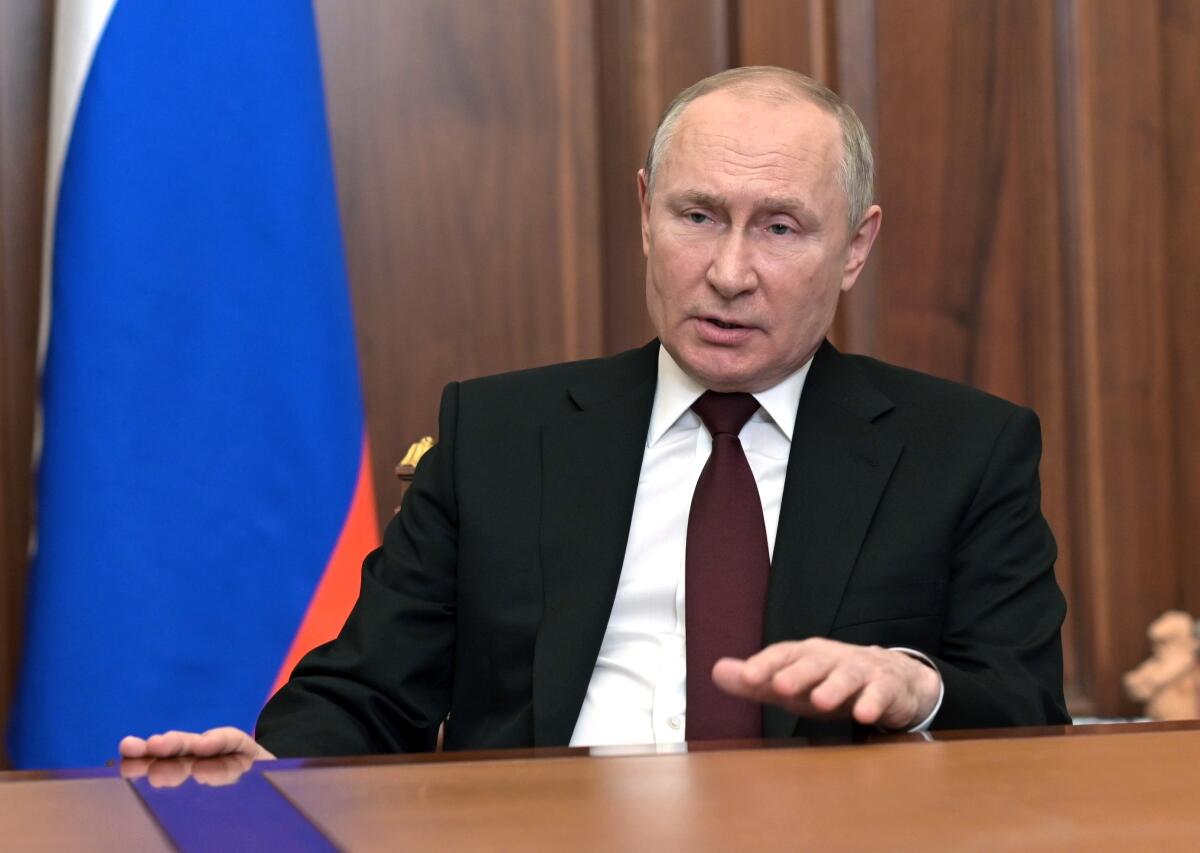Column: Putin’s wish and the consequences he can’t control

- Share via
Vladimir Putin announced Monday that he had decided to recognize two regions in eastern Ukraine as independent breakaway “republics” and immediately ordered Russian troops into those territories to carry out “peacekeeping” functions. A better term would be “tornaway republics” since Putin has been waging war there for years. It remains to be seen whether this is the start of an all-out invasion of Ukraine.
Regardless, Putin should be careful what he wishes for.
In American foreign policy debates, “careful what you wish for” is a common refrain. Various realists, non-interventionists and isolationists championing “restraint” invoke it all the time. Citing Thomas Jefferson’s caution against “entangling alliances” and John Quincy Adams’ admonition against going abroad “seeking monsters to destroy,” opponents of an assertive U.S. foreign policy have been warning of “blowback” or “unintended consequences” for generations.
It’s great advice — and not just when it comes to foreign policy. What parent hasn’t said “be careful what you wish for”?
My problem is that in the American context, such warnings tend to be parochial and arrogant, because they assume that America’s foreign policy options are unconstrained and any use of force — or step in that direction — is purely a matter of ideological choice. Thus, every policy mistake or setback is seen as stemming from a decision we didn’t have to make.
Using this lens, our adversaries’ actions are rational, inevitable or understandable responses to our blundering. (There’s a lot of this sort of thing on the right of late. Putin’s aggression toward Ukraine is apparently both Joe Biden’s fault and none of our business).
Sometimes, however, America isn’t the victim of blowback, it is the blowback. For instance, someone should have told Osama bin Laden to be careful what he wished for. He got what he wanted on 9/11. He hoped the attack would launch a war between the West and the Islamic world ending with an Al Qaeda-led victory against the West. Suffice it to say, he died from foreign policy blowback.
Similarly, restraint invites blowback, too. The withdrawal from Afghanistan was the greatest foreign policy win for the champions of retrenchment and restraint in decades, demonstrating there’s a significant difference between winning a policy dispute and a policy win.
Putin always wins policy disputes because he’s a gangster-autocrat — nobody who wants to stay out of prison or the grave disputes his policies. But that doesn’t mean those policies have been successful. His Ukraine strategy has been backfiring for years.
Russia’s heavy-handed meddling resulted in the 2014 Maidan revolution, and Ukraine’s reorientation toward the West and democracy. His unfolding effort to intimidate Ukraine back into a vassal state and to neuter NATO have also backfired. Ukrainian national identity and commitment to democracy have intensified. And rather than force NATO to shrink back to its 1997 membership, as Putin demanded, he may have enticed Sweden and Finland to join it.
It’s often said that Putin “has all the cards” in the Ukrainian crisis. This is true, if you mean that he’s the primary driver of events. But driving events and having mastery over them are two very different things.
We should do everything short of putting U.S. troops in Ukraine to deter Putin because an all-out invasion would be a humanitarian and geostrategic catastrophe. But it’s also hard to see how all-out war would end well for Putin. The Ukrainians will fight. And there’s no reason to believe the Russian people want to see Russians die by the thousands to kill Ukrainians by the tens of thousands.
It’s worth noting that Putin has gone to extraordinary lengths to hide the Russian casualties of his military forays, because he recognizes how brittle public support for his rule really is. Western sanctions would further cripple Russia economically and any hopes that NATO would continue to whither as a military force would probably vanish.
The Biden administration has made mistakes so far. It should have issued new sanctions the moment Putin started to amass troops on the Ukraine border. It shouldn’t have surrendered in Afghanistan the way it did.
But once Biden recognized the stakes of this crisis, his strategy has had much to commend it. By releasing intelligence — real and alleged — about Putin’s intent to invade under some bogus pretext of “provocation,” the administration made it harder for Russia to follow its planned script.
The point is to force Putin to realize that he can’t will victory into existence. Because he has no one in his inner circle to tell him, “be careful what you wish for,” that job has fallen to us. We’ve failed to convince him so far, but events not to his liking may force the lesson upon him eventually.
More to Read
A cure for the common opinion
Get thought-provoking perspectives with our weekly newsletter.
You may occasionally receive promotional content from the Los Angeles Times.











